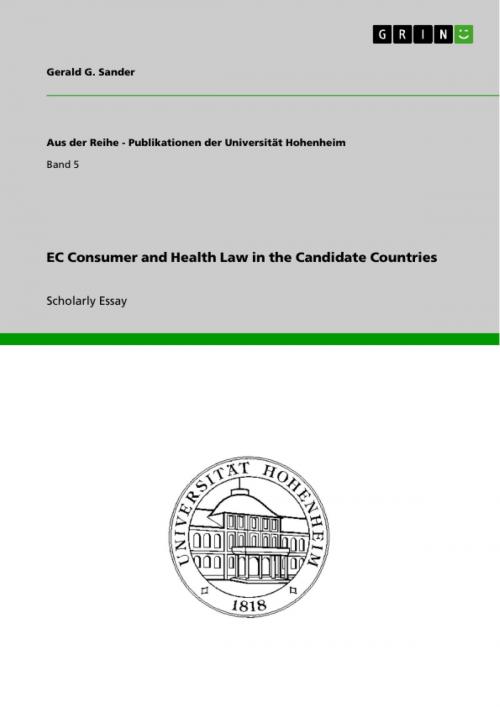EC Consumer and Health Law in the Candidate Countries
Nonfiction, Reference & Language, Law, International| Author: | Gerald G. Sander | ISBN: | 9783638145879 |
| Publisher: | GRIN Publishing | Publication: | October 8, 2002 |
| Imprint: | GRIN Publishing | Language: | English |
| Author: | Gerald G. Sander |
| ISBN: | 9783638145879 |
| Publisher: | GRIN Publishing |
| Publication: | October 8, 2002 |
| Imprint: | GRIN Publishing |
| Language: | English |
Scientific Essay from the year 2002 in the subject Law - European and International Law, Intellectual Properties, University of Hohenheim (Law), language: English, abstract: In a modern industrial society that offers such a variety of goods and services, consumer protection plays an increasingly important role. The vast variety of goods and services often leaves the consumer to make a decision about a purchase without possessing all the relevant information. The self-interest nature of consumers has led to the establishment of consumer protection unions. Prior to the Amsterdam Treaty, consumer policy was seen as the direct preserve of the Member States. There was only a very small unit in the Commission concerned with consumer protection and it was not very influential and being attached to the Internal Market Directorate General. As a direct result of the BSE crisis consumer policy was given a distinct Directorate General. The BSE crisis increased the power of the now extremely influential European Parliament Committee for Environment and Consumers, especially as regards the European Commission as this Committee contained and still contains the rapporteur responsible for holding the Commission to task (threat of censure) over the handling of the crisis and the subsequent re-shuffle of the Commission Services. Competencies of the Commission Directorates General responsible for agriculture, for the Internal Market and for the environment were transferred to the new Consumer Directorate, which was established 1997. This has inevitably brought about a fundamental policy shift in proposed EC legislation but also in the implementation of legislation because of the number of comitology committees - ranging from scientific committees for food (GMOs for example) to animal health and welfare and veterinary and phytosanitary questions - have been transferred to the new Comitology Directorate General. The concept of consumer protection is neither an uniform regulated nor sharply defined political area. Although it consists of various preventative measures, it is not an individual sector. The broad palette of enacted rulings clarifies the character of consumer protection as task with relations to nearly every policy field. The individual measures go so far as to establish standards for door-to-door sales, pharmaceuticals, foodstuffs, price indication, and product liability as well as to establish regulations for toys, time sharing, and the extension of credit to consumers. In terms of Article 153 paragraph 2 and Article 95 paragraph 3 EC, the demands of consumer protection must be taken into account in all Community policies. [...]
Scientific Essay from the year 2002 in the subject Law - European and International Law, Intellectual Properties, University of Hohenheim (Law), language: English, abstract: In a modern industrial society that offers such a variety of goods and services, consumer protection plays an increasingly important role. The vast variety of goods and services often leaves the consumer to make a decision about a purchase without possessing all the relevant information. The self-interest nature of consumers has led to the establishment of consumer protection unions. Prior to the Amsterdam Treaty, consumer policy was seen as the direct preserve of the Member States. There was only a very small unit in the Commission concerned with consumer protection and it was not very influential and being attached to the Internal Market Directorate General. As a direct result of the BSE crisis consumer policy was given a distinct Directorate General. The BSE crisis increased the power of the now extremely influential European Parliament Committee for Environment and Consumers, especially as regards the European Commission as this Committee contained and still contains the rapporteur responsible for holding the Commission to task (threat of censure) over the handling of the crisis and the subsequent re-shuffle of the Commission Services. Competencies of the Commission Directorates General responsible for agriculture, for the Internal Market and for the environment were transferred to the new Consumer Directorate, which was established 1997. This has inevitably brought about a fundamental policy shift in proposed EC legislation but also in the implementation of legislation because of the number of comitology committees - ranging from scientific committees for food (GMOs for example) to animal health and welfare and veterinary and phytosanitary questions - have been transferred to the new Comitology Directorate General. The concept of consumer protection is neither an uniform regulated nor sharply defined political area. Although it consists of various preventative measures, it is not an individual sector. The broad palette of enacted rulings clarifies the character of consumer protection as task with relations to nearly every policy field. The individual measures go so far as to establish standards for door-to-door sales, pharmaceuticals, foodstuffs, price indication, and product liability as well as to establish regulations for toys, time sharing, and the extension of credit to consumers. In terms of Article 153 paragraph 2 and Article 95 paragraph 3 EC, the demands of consumer protection must be taken into account in all Community policies. [...]















